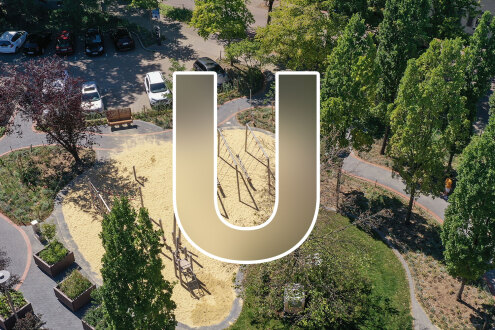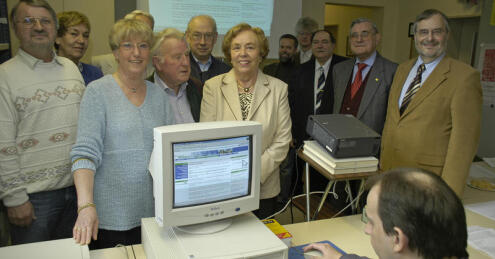U
U
Urbachstraße
This street was named after the textile manufacturer and councillor of commerce Wilhelm Urbach (1808-1886).
Lit:
Gerhard Schmalstieg, Straßennamen in Bocholt nach nur hier bekannten Personen, in: UNSER BOCHOLT Jg. 55 (2004) H. 4, pp. 53-72.
Wilhelm Seggewiß, Bocholter Straßen erzählen Geschichte, in: UNSER BOCHOLT Jg. 39 (1988), H. 3, p. 29.
(31.10.07 08:50)
Primitive whales in Biemenhorst
In December 1953, children playing in the disused brick pit of the Lueb-Vagedes company in Biemenhorst found fossilised bone remains. The subsequent excavations, which began on 12 April 1954 under the direction of Dr Alexander von Schouppe', lecturer in palaeontology at the University of Münster, and Dr Scholz, preparator at the Geological Museum in Münster, revealed that the uncovered fossils were the bones of two prehistoric whales (zeuglodonts) from the Tertiary period. The bones were around 8-10 million years old. At the end of the Tertiary period, there was a bay in Biemenhorst and Lankern where the 15-20 metre long prehistoric whales lived. They differed from the whales living today in that their front limbs were formed into flippers with five movable fingers and stunted hind limbs.
Lit:
Paul Heinrichs, in: UNSER BOCHOLT, vol. 8 (1957) p. 1, pp. 32 - 36 Burghard Fehre
(05/09/06 13:21)
Bocholt University Days/Bocholt University Days
On Sunday, 25 October 1953, the University Days were opened for the first time in Bocholt, at that time in the form of a university week. The opening lecture was given at 11.15 a.m. in the lecture hall of the vocational school, Herzogstraße, by the lawyer and then Rector of the Westfälische Wilhelms-Universität Münster, Prof. Dr Harry Westermann, on the subject of "Equal rights for men and women in future family law".
The next lecture series then took place in 1955 and from then on was organised as the University Days. At the opening of the University Days in 1955, Ludwig Kayser, then head of the town council, said: "Bocholt was in the middle of its reconstruction after almost complete destruction. We people are often inclined to see the reconstruction only in the external reconstruction, in the reconstruction in stones and furniture. It is urgently necessary that soul and spirit are not neglected in the process. For people, home is what largely consists of soul and spirit" (quoted by Josef Niebur in a documentation of the organisers' association about the University Days from "Scientists come to Bocholt", Bocholter Volksblatt 23.10.1953).
In the following years, the University Days took place every two years. The series was always organised with highly interesting topics from various fields of scientific research. Some of the speaker names read like a "who's who" of German scientific history.
Just to name a few examples: the Cologne Cardinal Professor Dr Joseph Höffner, the Mainz Cardinal Professor Dr Herrmann Volk, the important Protestant theologian of the 1950s and 1960s, Professor Dr Rengstorf, the founder of modern political theology, Professor Dr Johann Baptist Metz, the then President of the Board of Directors of the Central Council of Jews Ignatz Bubis and Professor Hans K. Schneider (a member of the German Council of Economic Experts in the 1970s), Professor Dr Ludwig Siep, who was a member of the Federal Government's Ethics Commission until 2007, and Professor Dr van Hugo Karel Aken, then Director of the Central Clinical Centre at the University of Münster.
The University Days were held nine times up to 1969, then again in 1972. In 1982, the tradition of the University Days was resumed, with the Stadtsparkasse Bocholt joining the previous organisers (University of Münster, Adult Education Centre and City of Bocholt) as a partner, and the series has been held annually since then. In 1994, the organisers took account of the fact that the department of the Gelsenkirchen University of Applied Sciences had been founded in Bocholt, renamed the lecture series "Hochschultage" and included the Gelsenkirchen-Recklinghausen-Bocholt University of Applied Sciences in the group of organisers. Since 2003, the range of lectures has been supplemented by a special programme for sixth form students, which is offered once a year together with the schools in Bocholt leading to the university entrance qualification: The Bocholt University Counselling Day, at which specialist lecturers and student advisors from universities, as well as from the employment agency and the city savings bank, provide information about career and training prospects. Here, around 600 schoolgirls receive counselling from over forty employees from various institutions in one morning. In addition to the main organisers mentioned above, the University of Nijmwegen, the University of Twente, the AKI (Enschede University of the Arts), the SAXION University of Applied Sciences Enschede, the Münster University of Applied Sciences, the NRW University of Applied Sciences for Finance and the Bundeswehr University.
Lit:
Registry of the Bocholt-Rhede-Isselburg Adult Education Centre; Bocholter Borkener Volksblatt No. 247 from 23 October 1953: "Scientists come to Bocholt"; Westf. Rundschau No. 236, from 11 October 1955: "Bocholter Universitätstage 1955 sind eröffnet"; Josef Niebur: "For me, everyone is good ..." - 50 Jahre Hochschultage in Bocholt, documentation of the Bocholt-Rhede-Isselburg Adult Education Centre; The University Days at the Adult Education Centre in Bocholt through the ages (1953-1999); Leutnant u. cand. päd. Oliver Mark Baumann: Seminar paper, University of the Federal Armed Forces Hamburg in cooperation with the Bocholt-Rhede-Isselburg Adult Education Centre.
Reinhold Sprinz and Josef Niebur (02.09.09 11:53 am)
UNSER BOCHOLT, magazine for culture and local history
Since 1950, the magazine for culture and local history, published by the Verein für Heimatpflege Bocholt E.V., has appeared in Bocholt, initially monthly and since the mid-1950s four times a year. For more than half a century, hundreds of scientific, popular scientific and entertaining articles by well-known authors and experts have provided important information on almost all areas of life in our city. A considerable number of subscribers shows that the editorial concept has always been correct and accepted in its versatility and impartiality since its inception. Today, UNSER BOCHOLT is a compendium with the most necessary and sometimes very detailed information about the city of Bocholt and its surrounding area. The editors of the Bocholt city encyclopaedia repeatedly refer to articles in this magazine in their encyclopaedia articles.
After the founder Fritz Lindenberg and the former city archivists Dr Elisabeth Bröker and Dr Hans D. Oppel, the current city archivist Dr Axel Metz has been editing the journal as editor since the beginning of 2011 in close cooperation with the editorial committee of the Verein für Heimatpflege (Association for the Preservation of Local History) under the leadership of former senior director of studies Wolfgang Feldhege and with former authorised signatory Margret Bongert, former director of studies Klaus Dierkes, former senior administrative councillor of the city of Bocholt and the former head of the city of Bocholt. Former Chief Administrator and Director of the Bocholt City Museum Georg Ketteler, former Rector Rudolf Neise, Dr Hans D. Oppel, former Deputy City Archivist Annemarie Rotthues and Prof. Dr Christian Will. Wolfgang Tembrink, who is now responsible for writing the town chronicle and also contributes articles himself, is available as a competent member of staff for all questions relating to the publishing house.
Over the many years of its existence, the journal has also had an impact and attracted attention beyond Bocholt's borders, particularly with special themed issues. Recent publications include special issues entitled "275 Jahre Fußprozession Bocholt-Kevelaer 1733-2008" (issue 3/2008) or " Der letzte Gang" as an accompanying issue (issue 3/2006) for the NRW national day of mourning - this issue was purchased by the state parliament for all members of parliament - as well as for the 600th anniversary of the oldest active Bocholt shooting club St. Georgius (issue 2/2007).
UNSER BOCHOLT is there for everyone: The magazine is offered by the publisher with the support of the city of Bocholt, all advertising subscribers and individual donations at cost price. It is also available from the city archives, the city museum, the Westphalian Textile Museum and local bookshops and newsagents.

Contact us

About the city encyclopaedia
The city encyclopaedia was launched in 2003 by a working group under the leadership of the then city archivist Dr Hans-Detlef Oppel and presented to the public.
Interesting articles and contributions were compiled from various publications, including Bocholt's local magazine "Unser Bocholt", which is still published regularly by the Verein für Heimatpflege.

© Bruno Wansing


